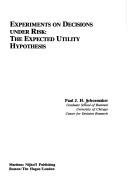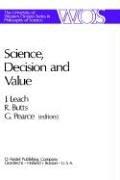| Listing 1 - 10 of 78 | << page >> |
Sort by
|
Book
ISBN: 1009198297 1009198262 1009198270 1009198254 Year: 2023 Publisher: Cambridge : Cambridge University Press,
Abstract | Keywords | Export | Availability | Bookmark
 Loading...
Loading...Choose an application
- Reference Manager
- EndNote
- RefWorks (Direct export to RefWorks)
This Element offers an accessible but technically detailed review of expected utility theory (EU), which is a model of individual decision-making under uncertainty that is central for both economics and philosophy. The Element's approach falls between the history of ideas and economic methodology. At the historical level, it reviews EU by following its conceptual evolution from its original formulation in the eighteenth century through its transformations and extensions in the mid-twentieth century to its more recent supersession by post-EU theories such as prospect theory. In reconstructing the history of EU, it focuses on the methodological issues that have accompanied its evolution, such as whether the utility function and the other components of EU correspond to actual mental entities. On many of these issues, no consensus has yet been reached, and in this Element the author offers his view on them.
Book
Year: 2002 Publisher: Trieste : Università degli studi di Trieste. Dipartimento di matematica applicata "Bruno di Finetti",
Abstract | Keywords | Export | Availability | Bookmark
 Loading...
Loading...Choose an application
- Reference Manager
- EndNote
- RefWorks (Direct export to RefWorks)
Recherche opérationnelle --- Utility theory --- Utilite (economie politique) --- Utility theory --- Utilite (economie politique)
Book
ISBN: 0199372802 0199372780 0199372799 Year: 2018 Publisher: New York, NY : Oxford University Press,
Abstract | Keywords | Export | Availability | Bookmark
 Loading...
Loading...Choose an application
- Reference Manager
- EndNote
- RefWorks (Direct export to RefWorks)
This text reconstructs the history of utility measurement in economics, from the marginal revolution of the 1870s to the beginning of behavioral economics in the mid-1980s.
Utility theory. --- Economics --- History. --- Demand (Economic theory) --- Value --- Revealed preference theory

ISBN: 915542824X Year: 1991 Publisher: Stockholm : Almqvist & Wiksell : Acta universitatis upsaliensis,
Abstract | Keywords | Export | Availability | Bookmark
 Loading...
Loading...Choose an application
- Reference Manager
- EndNote
- RefWorks (Direct export to RefWorks)
Concave functions --- Economics, Mathematical --- Utility theory --- Demand (Economic theory) --- Value --- Revealed preference theory --- Economics --- Mathematical economics --- Econometrics --- Mathematics --- Functions, Concave --- Functions of real variables --- Methodology --- Concave functions. --- Economics, Mathematical. --- Utility theory. --- Fonctions de demande (theorie economique)
Book
ISBN: 9512909952 Year: 1997 Volume: 220 Publisher: Turku : Turun Yliopisto,
Abstract | Keywords | Export | Availability | Bookmark
 Loading...
Loading...Choose an application
- Reference Manager
- EndNote
- RefWorks (Direct export to RefWorks)
Choice (Psychology) --- Decision-making. --- Political participation. --- Political science --- Politics, Practical. --- Utility theory. --- Decision making. --- Choice (Psychology). --- Utilite (economie politique)
Book
ISBN: 9781107077799 9781139939515 9781107434783 1107077796 1322561109 1316255867 1316236943 131623505X 1139939513 1107434785 1316250180 1316253961 1316252078 1316248291 1316246396 9781316248294 9781316250181 9781316252079 Year: 2015 Publisher: Cambridge
Abstract | Keywords | Export | Availability | Bookmark
 Loading...
Loading...Choose an application
- Reference Manager
- EndNote
- RefWorks (Direct export to RefWorks)
Classical decision theory evaluates entire worlds, specified so as to include everything a decision-maker cares about. Thus applying decision theory requires performing computations far beyond an ordinary decision-maker's ability. In this book Paul Weirich explains how individuals can simplify and streamline their choices. He shows how different 'parts' of options (intrinsic, temporal, spatiotemporal, causal) are separable, so that we can know what difference one part makes to the value of an option, regardless of what happens in the other parts. He suggests that the primary value of options is found in basic intrinsic attitudes towards outcomes: desires, aversions, or indifferences. And using these two facts he argues that we need only compare small parts of the options we face in order to make a rational decision. This important book will interest readers in decision theory, economics, and the behavioral sciences.
Decision making --- Mathematical statistics --- Utility theory --- Decision making. --- Deciding --- Decision (Psychology) --- Decision analysis --- Decision processes --- Making decisions --- Management --- Management decisions --- Choice (Psychology) --- Problem solving

ISBN: 0898380359 9401750424 9401750408 9780898380354 Year: 1980 Publisher: Boston, Md. Martinus Nijhoff
Abstract | Keywords | Export | Availability | Bookmark
 Loading...
Loading...Choose an application
- Reference Manager
- EndNote
- RefWorks (Direct export to RefWorks)
Organization theory --- Risk --- Utility theory --- Risque --- Utilité (Economie politique) --- 519.226 --- 10.01.a --- Demand (Economic theory) --- Value --- Revealed preference theory --- Economics --- Uncertainty --- Probabilities --- Profit --- Risk-return relationships --- Inference and decision theory. Likelihood. Bayesian theory. Fiducial probability --- Verzekeringswiskunde ; Waarschijnlijkheidsrekening --- Risk. --- Utility theory. --- 519.226 Inference and decision theory. Likelihood. Bayesian theory. Fiducial probability --- Utilité (Economie politique) --- Finances

ISBN: 9027703272 9401025711 902770239X 9789027703279 Year: 1973 Volume: 1 Publisher: Dordrecht ; Boston, MA : D. Reidel,
Abstract | Keywords | Export | Availability | Bookmark
 Loading...
Loading...Choose an application
- Reference Manager
- EndNote
- RefWorks (Direct export to RefWorks)
Decision making --- Game theory --- Utility theory --- Prise de décision --- Théorie des jeux --- Utilité (Economie politique) --- Congresses --- Congrès --- Prise de décision --- Théorie des jeux --- Utilité (Economie politique) --- Congrès --- 165.4 --- 165.4 Kennis: zekerheid; geldigheid; oordeel; zijnsoordeel; waardeoordeel --- Kennis: zekerheid; geldigheid; oordeel; zijnsoordeel; waardeoordeel --- Decision making - Congresses --- Game theory - Congresses --- Utility theory - Congresses
Periodical
ISSN: 17607507 Year: 2006 Publisher: Paris, France : Centre Bentham
Abstract | Keywords | Export | Availability | Bookmark
 Loading...
Loading...Choose an application
- Reference Manager
- EndNote
- RefWorks (Direct export to RefWorks)
La Revue d’études benthamiennes propose une ouverture interdisciplinaire aux études sur l’utilitarisme et sur des pensées d’expression anglophone en France. Elle traite aussi bien de l’utilitarisme classique (de Bentham à Henry Sidgwick et G.E. Moore) et des courants de pensée contemporains dans les domaines de l’économie, du droit et de la philosophie, encourageant ainsi l’ouverture à toutes les disciplines des sciences humaines et sociales sur des thèmes, auteurs, objets, histoire compris par le spectre de la Revue.
Utilitarianism --- Utility theory --- Utilitarisme --- Utilité (Economie politique) --- Periodicals --- Périodiques --- Bentham, Jeremy, --- Bentam, Ieremi︠a︡, --- Bentam, Dz︠h︡eremi, --- Bentham, Jeremías, --- Bentham, Jérémie, --- 邊沁, --- Beauchamp, Philip --- Bentam, Dz͡heremi, --- Bentam, Ieremi͡a,

ISBN: 9780511498602 9780521800099 9780521038034 0511018924 9780511018923 0521800099 0511498608 1107122368 0521038030 1280430184 051104738X 9786610430185 0511175221 0511155425 0511302509 Year: 2001 Publisher: Cambridge, UK New York Cambridge University Press
Abstract | Keywords | Export | Availability | Bookmark
 Loading...
Loading...Choose an application
- Reference Manager
- EndNote
- RefWorks (Direct export to RefWorks)
In Decision Space: Multidimensional Utility Analysis, first published in 2001, Paul Weirich increases the power and versatility of utility analysis and in the process advances decision theory. Combining traditional and novel methods of option evaluation into one systematic method of analysis, multidimensional utility analysis is a valuable tool. It provides formulations of important decision principles, such as the principle to maximize expected utility; enriches decision theory in solving recalcitrant decision problems; and provides in particular for the cases in which an expert must make a decision for a group of people. The multiple dimensions of this analysis create a decision space broad enough to accommodate all factors affecting an option's utility. The book will be of interest to advanced students and professionals working in the subject of decision theory, as well as to economists and other social scientists.
Decision making. --- Utility analysis. --- Deciding --- Decision (Psychology) --- Decision analysis --- Decision processes --- Making decisions --- Management --- Management decisions --- Choice (Psychology) --- Problem solving --- Decision making --- Utility theory. --- Demand (Economic theory) --- Value --- Revealed preference theory --- Arts and Humanities --- Philosophy
| Listing 1 - 10 of 78 | << page >> |
Sort by
|

 Search
Search Feedback
Feedback About UniCat
About UniCat  Help
Help News
News